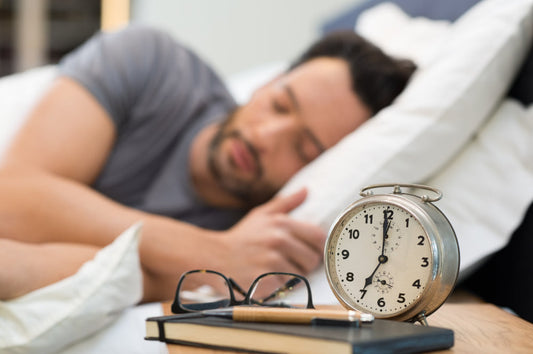Most people first notice it on a Sunday.
It usually hits around 6pm.
A slight sinking feeling when we realize all that stands between us and another week at work, is sleep.
It's nothing serious - just a general reluctance to admit the weekend is over.
We all get it.
So, we sit back, settle in, and prepare to eke out what remains of our weekend.
And before we know it, we've binged 4 episodes of that new Netflix doc and it's way, way past our bedtime.
But for a lot of people, it's not just on a Sunday.
It's happening most nights. And it's been given a name: Revenge Bedtime Procrastination.
What is Revenge Bedtime Procrastination?

If you've ever told a child it's time for bed, only to be met with a complete meltdown - we're kind of doing that. But in an adult way.
It's a peculiar phenomenon that refers to the intentional delay of sleep, in order to get more time to ourselves. Even though we know that not getting enough sleep is ultimately bad really bad for us.
The term Revenge Bedtime Procrastination was originally coined in China. And while the idea of putting off sleep to gain a bit more 'me' time isn't necessarily new. For this behavior to be classed as RBP, your late-night routine must include the following 3 elements: (1)
- Your late nights have to reduce your total sleep time.
- You must choose to be up late, rather than being up for a valid reason such as illness or childcare.
- You know the consequences of what you're doing, but you do it anyway.
What does revenge have to do with it?
Bedtime procrastination is nothing new. We've been putting off going to bed for years. But the idea of revenge comes in as a reference to the personal retaliation element. We're taking a stand against our lack of free time during the day. Albeit - we're punishing ourselves in the process.
Why do we do it?
The phenomenon was a reaction to the exhausting 9-9-6 work culture in China—working from 9 in the morning to 9 in the evening, six days a week. But it's not just those who work long hours. Parents, students, professionals - it's anyone who feels their days are owned by someone else.
Is it a form of self-sabotage?
We know we need sleep. Yet there we are: just one more episode, just one more chapter, just one more sweep of our socials. There are a few reasons why we do it:
Lack of Free Time During the Day: From the moment we wake up, it's a race against time. Work, school, family, there's always something. By the time we get a moment to ourselves, the day is almost over. We need some time for ourselves.
Stress and Overwork: In a world where being busy is often seen as a badge of honor, stress and burnout is almost seen as part of the job. Having some kind of escape at the end of the day when everyone else has gone to bed is a way to decompress and relax.

Seeking Control: When it feels like every minute of our day is scheduled by someone else, those late-night hours become our little slice of freedom and something we can control.
Digital Temptation: We can't put our phones down. With entertainment and dopamine hits at our fingertips, it can be addictive. We're even scrolling whilst watching tv. The feeling that there's something we're missing, or a feel-good hit that could be lost in our feed, has us staying up way past our bedtime.
Putting Off Tomorrow: And then there's this idea of delaying the inevitable. Going to sleep means the next day comes sooner, and with it, all the responsibilities and routines we're not quite ready to face again.
Whatever the reason for this behavior, figuring out why we do it, is the first step to figuring out how to stop it.
And we really should stop it.
Because sleep isn't just a nice-to-have. It's one of the most powerful things we can do for our bodies.
What's the Psychology Behind Bedtime Procrastination?
For the act of revenge itself, i.e. not going to bed. The reasons behind it could be a mix of emotional, cognitive, and situational factors. There's a human need to feel like we have control and autonomy over our lives. It's a way of asserting ourselves.
It may be down to stress relief, the need to decompress. Engaging in enjoyable activities at night is a way of winding down and disconnecting from the day.
All these reasons are valid. But the bigger question is, why do we do this when we know that losing out on sleep is so damaging to our health? But we do it all the time. Diet, exercise, sleep - we know what we should be doing, but why aren't we doing that?
Imagine you're on a beach.
The sun is shining, you've got your swimmers on and you're ready to hit the surf.
However, there was a shark attack here last month.
You know this because you can see a sign that says, "Shark Attack Here Last Month." As you take in this information, you look out to sea, and in the not too far away distance, you make out three large shark fins. Circling in the water.
Are you going in?
Our brains are wired to prioritize present, certain risk over something that may happen in the future. It goes back to the fight or flight response. Long term threats are less obvious, so they don't trigger the same instincts.
Not only do our brains find it hard to think ahead, but we also struggle to resist short-term pleasure. So, resisting the urge to stay up and watch that documentary everyone's talking about, is even harder.

Consequences of Bedtime Procrastination
We know you hear it all the time, but there's a reason for that. Sleep is perhaps the best thing we can do for ourselves when it comes to maintaining a happy and healthy body and mind.
The impact of not getting enough sleep is far reaching. From cardiovascular health to mood, immunity, and metabolism.
Cardiovascular Health: Lack of sleep has been linked to an increased risk of heart disease, hypertension, and stroke. (2)
During sleep the heart rate and blood pressure both decrease during non-REM sleep which provides a necessary period of rest for the cardiovascular system. It also helps regulate the body's stress hormones such as cortisol. Elevated levels of stress hormones can increase the risk of hypertension and heart disease.
Glymphatic System: this is the waste clearing system of the brain. It functions primarily during sleep and clears out harmful toxins and metabolic waste including proteins like beta-amyloid which are associated with neurodegenerative diseases. (3)
Immunity: During sleep, the production of certain cytokines increases. Cytokines are proteins that play a vital role in the immune system, helping to fight off infections and inflammation. Adequate sleep also promotes the production and effectiveness of T-cells, which are white blood cells essential for immune response. (4)
Chronic sleep deprivation can lead to a weakened immune system, making the body more susceptible to infections.
Weight Management: Sleep influences the hormones that regulate appetite, ghrelin - which makes you hungry and leptin which signals you're full. Lack of sleep can mess with these levels, leading to increased hunger and appetite, and an increased appetite for snacking. (5)
Metabolism and insulin levels are also impacted by sleep. Insufficient sleep can lead to a decrease in insulin sensitivity - which in turn, can lead to an increase in appetite.
How to Overcome Sleep Procrastination

It's thought that how well we sleep is directly linked to how well we can detach from our day.
Which is a catch-22 situation.
If we don't have time to detach from our day, we need time to do that. Which in turn delays sleep, meaning we get less of it. That lack of sleep has a negative impact on the following day, and we end up repeating the cycle.
So what can we do to help ourselves?
Getting into a healthy nighttime routine is good practice and can help reduce the impulse to stay up late.
Set a sleep alarm. In the same way we set an alarm to wake ourselves up. We can set an alarm to remind ourselves to go to bed. If you have an iPhone, look in the Health app where you can set a wind down schedule. It can also help reduce distractions before bedtime by muting chat and app notifications and showing you as unavailable.
Don't associate bed and bedtime with sleeping. It might sound counterintuitive, but sometimes taking the pressure off yourself helps. Rather than only thinking of your bedroom as somewhere you go to sleep, think of it as somewhere you unwind.
A change of scenery can be a reset. So, if your go-to location for those last precious hours is the sofa in front of the tv. Swap the sofa for your bedroom and start a wind down routine. Read a book, listen to some music, take up ASMR or EFT tapping. Create new rituals that will help you reach a state of sleepiness.
Keep a consistent sleep schedule. Continue your weekday sleep schedule into the weekend. By going to bed and waking up at the same time every day, you reinforce your body's circadian rhythm which can lead to improved sleep quality and reduced sleep latency.
Maintaining this regularity helps your body anticipate sleep. It also fosters behavioral discipline, which can make it easier to resist staying up late for non-essential activities.
Create your own shutting down ceremony.
Post-COVID, flexible working has made it harder to switch off. With many of us working from home, the transition from worktime to me-time has become blurred. Before we had the physical switch off when we left the office. Followed by the mental switch-off on the commute home. Now there's a temptation to just 'nip back on' to sort something out.
Our brains are tethered to our work life, even out of hours.
If you're working at home, create your own shutting down ceremony to mark the end of your working day. Start by making a list of any outstanding tasks. Close all windows in your browser. Switch everything off and tidy your desk. If you can, go for a walk around the block. A stand-in commute of sorts. Even better, engage in some exercise. Not only does it put distance between you and your day, but it can also help de-stress and leave you with a different type of energy as you enter the evening.
Creating these behaviors can help reinforce positive behavioral patterns that just might break the cycle of sleep procrastination.
Because prioritizing sleep is essential.
















